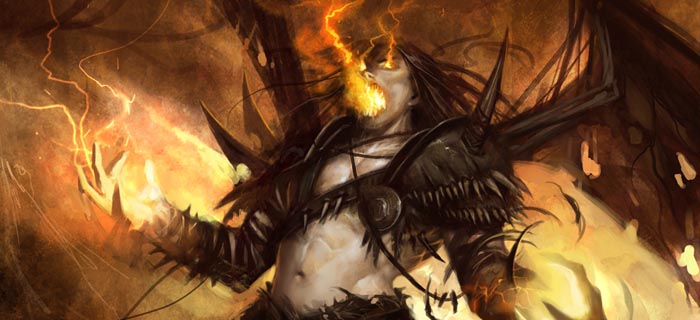Time vs Money: The false dilemma of grind
With the arrival of Diablo 3 and its real money auction house (RMAH), players worldwide* have fallen into shouting matches about the value of gear and the reward of experience.
On one hand, hardcore players scorn those who would waste real dinero on virtual items they didn’t even earn.
On the other hand, affluent adults argue they shouldn’t miss out on content because they don’t get summers off.
Both sides have valid points, of course. But ultimately, this debate was only a symptom of the real problem…
The “right” way vs. the “right now” way
For traditional hardcore gamers, the concept of paying real money for virtual items just feels wrong on many levels. These players often don’t believe cash should be wasted on digital armor and weapons, and they’re not usually fans of paid DLC or the like to begin with. Playing the game is its own reward, and patience pays off in experience, loot, and the dignity of having accomplished everything the old-fashioned way.
Additionally, anti-microtransaction gamers don’t really consider it fair if other people can swipe an AmEx card to get the same loot they spent hundreds of hours acquiring. And with an increasing number of games including such systems, it can easily feel that the power of the almighty dollar is reaching too far into an otherwise competitive, balanced system. What’s the point of getting good at a game if some geezer can just bid for the best items available?
Many older players, of course, have no qualm with dropping $10 to $20 if it means avoiding five hours of loot runs, boss raids, or other grinds. These gamers, the majority of whom are adults with enough disposable income to buy a new game every week, see their time as more valuable than the “dignity” of getting their hands dirty to compete.
From the perspective of time-strapped players, they’re the ones at a disadvantage. While they’re stuck at the office all day, or perhaps busy chasing three kids around the house, the anti-payment gamers have 20+ hours a week to hunt for loot and memorize damage charts. By the time our richer comrades get online, they’re eighteen levels behind everyone else and trodding through the game wearing something they found in a box of scraps. Should a game’s system requirements really include “Playing this title like your second job”?
The root of the problem
Trick question. Because whatever camp you happen to side with, the problem was never other players getting an unfair advantage via time or money expenditure.
The problem was that these games required so much goddamn grind to begin with.
Videogame studios were increasingly adding unlocks and random rewards to their games to increase revenue and create habit-forming playstyles that demanded nearly infinite replays. With the introduction of achievements, the perfect balance of expected and unexpected rewards had been created. Grind would become the de facto state of modern gaming.
And that addictive, random-reward Pavlovian bullshit kept you playing Diablo, Mass Effect 3 multiplayer, and hell, even Magic: the Gathering for so long. Every time you identified a rare item or bought a Premium Spectre Pack or opened a new pack of cards, the adrenaline pumping through your veins reinforced your need for more. You saved your lunch money for new packs of Kamigawa, or perhaps you even cheated at Draw Something to finally unlock another can of the world’s most expensive digital paint. And whether you were paying for these experiences with hours of work in-game or hours of work on the job, you sacrificed something meaningful every time just to have a chance at a new reward.
All these system really did, of course, was add an artificial layer of “replayability” to games via monotony and random chance. If you unlocked specific equipment at certain levels in Diablo 2, you wouldn’t have to perform Baal runs for 30 hours straight. If Bioware gave you all your single player equipment the moment you signed into multiplayer, you could crush Reaper forces from the get-go, spending your time having fun instead of farming Firebase White. If you started Draw Something with some decent colors, maybe your idiot cousin would be able to guess you were illustrating Double Rainbow.
I mean seriously how hard is it to just give me purple, Zynga?
Back to the blame game
Anyway, it quickly becomes clear that it was never the spoiled high schoolers with too much time on their hands who made it difficult to compete. It wasn’t rich, Wall Street weekend gamers who bought max-level characters that kept you from getting the most out of your game.
It was the development studio that designed your experience to revolve around flushing your time and/or money down the toilet in the pursuit of random, shiny objects you might never even get.
Instead of crafting gameplay based on skill, planning, or tactics, they wanted your entire experience to depend on how addicted you were to the game’s ridiculous systems. And if that addiction and emotional investment got high enough, you might be willing to spend more hours in game, more money in the auction house, or more time telling your friends about just how “good” your new game was and how you just couldn’t put it down.
Because even if you weren’t going to spend another dime on hats in Team Fortress 2, there was a good chance your pals would at some point. As with any habit-forming activity, it would be passed around your social circle until every last one of your gaming buddies was a mindless addict. Before long, they’d all be drooling while throwing money at the screen, shouting at the game to give their in-game avatars prettier DLC dresses.
Small hope for microtransactions
Some players will still prefer high-grind games for whatever reason. Maybe they just enjoy the thrill of the hunt. Or perhaps, whether their wealth is earned in-game or out, they’re just the kind of people who like feeling superior to their poorly-equipped contemporaries. Until you see casinos and lotteries shutting down worldwide, you can bet there’s still a market for random reward money/timesinks.
But that doesn’t mean games are doomed to grinding the fun out of their experiences. Many titles, most notably Guild Wars 2, are designed to make players competitive without huge time investments. In ArenaNet’s upcoming MMO, players and their gear are automatically upscaled in PvP and downscaled in low-level areas, making most grind (and the need to buy advantages) pointless.
And when real money shops are available, some games like Path of Exile are reserving purchases for aesthetic-only items that won’t let the lawyer next door buy his way to the top of the ladder. Valve’s hat-conomy in Team Fortress 2 is quite similar, granting players cool points without letting them win more easily with slick hats. Yes, weapons are also available in TF2’s shop, but the vast majority of them are arguably worse than the default kits for each class.
Maintaining perspective
A Greek poet once said, “Don’t hate the player, hate the game.” Truer words have never been spoken. When you boot up Diablo 3 and see a Demon Hunter stroll into town with a jewel-encrusted Windforce bow, don’t get jealous over how much time and/or money he has. Write down your scathing remarks and send them to Bashiok at Blizzard Entertainment instead. He’ll greatly appreciate your thoughtful rant.
* Except in Asia, because Blizzard doesn’t want their money.








When you say Baal, I think Disgaea, not Diablo. Also, is it weird that Tales of Vesperia has Level-Up DLC? I literally couldn’t believe it when I saw that.
Hmm, funny, we were discussing this the other day about how much of a run ME3 will get, how much longer will you play, save for a premium spectre packs and basically get nothing. What is Bioware going to do to make playing/grinding the multiplayer more attractive after the initial thrill is gone.
I realize they dangle the carrot, the possible “ultra rare” find but I have gotten all the unlocks (for characters) and still continue to get more character unlocks (and those XP points go by the wayside if your character is already up to level 20) .
I understand they have to give you a reason to play, or a reason to burn time and/or money if you wish to do so like MS points, but as you stated, its like opening up a pack a baseball cards, the initial thrill, the anticipation, then getting another common.
I’d like to see some kind of system/store that I could parlay my experience points/credits from ME3 multiplayer into buying a certain weapons and weapon upgrades that I’m wanting that I can’t seem to get in the packs. Maybe paying 75000 credits for that +1 gel pack or +1rocket quantity upgrade. You could make each weapon upgrade progressively more credits up to level 10 which could run you 1-2 million credits say for that last weapon upgrade.
But there has to be that fine line or the game wouldn’t be challenging if we had all the cool upgrades, and to keep you engaged to keep playing with the possibility of finding that “one” weapon that will get in that one pack that you decided to purchase when you thought all hope was gone.
I guess you have to figure out what drives you to keep you playing.
That’s why I like the way TF2 and SMNC run their models. Almost everything that’s unlockable can be acquired either by earning it on your own or just using your money, and neither method gives you an advantage over the other. Hell, for SMNC the buyable weapons are literally just reskins. There’s no presence of Play2Win anywhere, so it’s a good balance.
I have to agree with most what you said there WiNG,
players on both side of the fence have their arguments.
The thing that strikes me as quite idiotic and pretentious is when people whine about “richer” players buying their “advantages” instead of “earning” them in a PvE environment.
The fact that some people get upset about something that doesn’t even concern them is quite disturbing.
PvE, even if shared with other players, isn’t supposed to be competitive. Thats something that, as you said, Guild Wars 2 does quite elegantly. PvE is in a sense a bit like an offline title.
If I just goof around in GTA using cheats and start a big shootout on the roof, does that effect YOUR experience?
If you run around in an PvE area in an MMO and someone nearby has an Axe of +10 Awesomeness does that make you experience the game differently? At the very least, from a min-max standpoint, you’d be glad to have some overpowered dude nearby, because the content would get easier because of that.
Of course, when looked at from a PvP standpoint, there is absolutely no place for stuff like this being there: both grinding gear out nor buying them. (both are equally despiseable for me in an competitive environment.)
Either give me everything or don’t make it competitive.
A game that is stuck somewhere in the middle of that is Tribes: Ascend:
I like the way they are doing things, you can only buy DIFFERENT weapons and loadout kits, leveling up your gear is only possible through XP (which can be boosted for money, but you still need to play in order to get any). So it’s either grinding out or putting some cash in, which in book is fine AS LONG AS IT’S A FREE2PLAY TITLE!
Tribes is the first game with microtransactions that I ever sunk money into. My performance hasn’t gotten better, I’m just more flexible in what I can do.
Again, this obviously isn’t the perfect route to go, but after all, it’s f2p and I pumped 16€ in and got a really good value for it.
With GW2 this is a non factor, since it has a box price!
It is certainly a travesty when a player has to choose between sinking money or grind into acquiring the best gear for competition with other players–be it in PVP or for membership in elite raiding guilds–but I whole-heartedly condone the integration of real-money transactions in video games.
While I understand the power-gamer’s frustration with the never-ending battle against casuals with cash, ultimately it is a gamer’s choice to continue running the rat race. Gamers usually, if not always, have similar options (See, e.g., D3 complaints as compared to WiNG’s ne’er-wearied lobbying for Path of Exile) which provide the same kind of gaming experience without the money vs. time element.
Then, there is the rarely-entertained notion of playing non-competitively, a gameplay style which got me through my WoW days with a flourishing social life (read: “a friend or two”). Don’t like playing PVP because grinders and fatcats whip you every time? Don’t play it! Or, even better, don’t give a shit about the outcome. Find your own joy (read: “troll”).
Ultimately, my own experiences have shown me that many of those who complain the most about such practices are the ones who are filled with the most glee when they pwn a maximally-equipped, but inept, newb on the fields of glory (Warsong Gulch). “Fucking casuals!” is their battlecry, as their long, unkempt hair gusts behind them in the breeze from their desk fans, winding between the majestic green slopes of the mountain of Dew. Why should their moment be swiped by those who would have “fair play”? Who are we to judge their lust for humiliation?
My support is not without reservations. When a game is released with pre-planned DLC and a story or gameplay experience that feels unfinished, I rage alongside everyone else–the kind of quiet, inner rage that will one day drive me to unrepentant, unexplained spousal abuse. But when a studio I love creates truly superfluous content to extend or enhance my enjoyment of a beloved game (and price said content reasonably), I weep with joy. “You mean, I get to help fund these guys, AND pull that dusty game off the shelf for another bout of carnal fingerplay?” Yes. Yes, I do.
It’s gonna be hard for something to beat this for best comment of the month.
Screw Diablo and Blizzard
Screw Diablo, no!
Screw Diablo III I wouldn’t necessarily say either!
The thing with Blizzard is, Blizzard is not Blizzard!
If you want to play a game, made by the guys who made the original Diablo (or Diablo II, can’t remember), they are working on Torchlight II ;)
Companies own brand names, but the people involved in the creation of these titles are always in flux! A great example for this is Valve. Whenever there’s a succesful mod or whatever they just instantly buy up the staff and have them work on a new project under their banner. (See: Alien Swarm –> Left 4 Dead, Dota –> Dota2)
[…] weapons will have to be unlocked via good, old-fashioned grinding. Assuming you’re willing to put in the time and/or money to unlock all the goodies, here’s what you’ll have (potentially) waiting for you in […]
[…] were many to choose from, no doubt thanks to the large number of discussion-inspiring editorials posted in […]